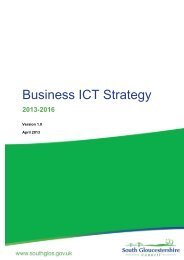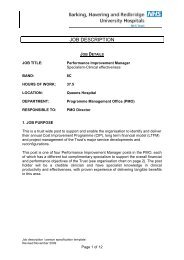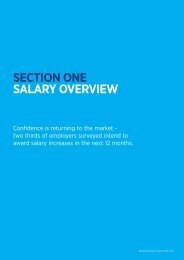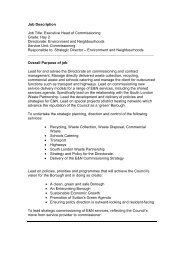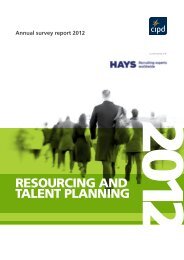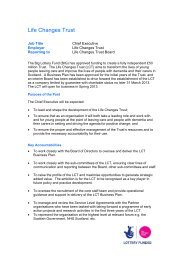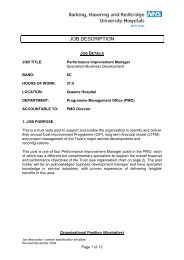Read the full report. - Hays
Read the full report. - Hays
Read the full report. - Hays
Create successful ePaper yourself
Turn your PDF publications into a flip-book with our unique Google optimized e-Paper software.
WORKFORCE FUTURES<br />
ROUNDTABLE REPORT<br />
This <strong>report</strong> summarises <strong>the</strong> key discussion points from <strong>the</strong> fourth Resourcing Futures roundtable held in<br />
2010, commissioned and hosted by <strong>Hays</strong> and attended by fourteen senior workforce leaders from<br />
different areas of <strong>the</strong> public sector, including central / local government and housing.<br />
The session was conducted and recorded under <strong>the</strong> ‘Chatham House Rule’.<br />
Changing Times: A New Type of Leader for a New Era of Government?<br />
A recent survey of public sector executives found that only 16% of respondents believe <strong>the</strong>ir existing<br />
leadership team is up to <strong>the</strong> challenges posed by <strong>the</strong> spending cuts. This roundtable discussion explored<br />
what qualities would be needed and how <strong>the</strong>y might be identified and nurtured.<br />
The session examined qualities as diverse as emotional intelligence and entrepreneurialism - as well as<br />
<strong>the</strong> danger of "tissue rejection" of new ways of working. It was noted that "to lead" is a verb, which<br />
implies action.<br />
The event opened with an introduction by Zoe Gruhn, Director of Learning at <strong>the</strong> Institute for<br />
Government, providing an overview of <strong>the</strong>ir recent research into governance, leadership and<br />
accountability – and <strong>the</strong> impact of <strong>the</strong>se factors on senior government officials (such as elected mayors<br />
and ministers).<br />
Summary of Discussion<br />
Attendees remarked at <strong>the</strong> speed of <strong>the</strong> coalition government's programme of change, with <strong>the</strong> fastest<br />
pace of change coming from <strong>the</strong> Communities and Local Government department.<br />
One delegate said that <strong>the</strong> move from a top-down management model to a regulatory model would<br />
require a different approach to leadership: <strong>the</strong> ‘tight-loose’ blend. There is a new role for government<br />
departments as coordinators ra<strong>the</strong>r than top-down administrators: "It is a sea change in <strong>the</strong> way<br />
government operates."<br />
Several delegates suggested changes that could be required from public sector leadership.<br />
- There may be greater movement in and out of roles<br />
- More clarity on <strong>the</strong> role of boards<br />
- A new need for agility, especially with <strong>the</strong> regulatory model.
Pre-requisites for leadership in <strong>the</strong> new world would be:<br />
- A vision of where <strong>the</strong> organisation is going<br />
- The ability to communicate that vision<br />
- Strong determination to make it happen<br />
Additionally, <strong>the</strong>re will be much demand for empathy and imagination.<br />
It was noted that most Whitehall departments did not have a clear narrative of what <strong>the</strong>y would look like<br />
when <strong>the</strong> cuts process had run its course. There is a need to give people a strong sense of <strong>the</strong>ir worth<br />
and purpose.<br />
Leaders must have a genuine and wide understanding of <strong>the</strong> social context in which <strong>the</strong>y operate. Front<br />
line experience is absolutely essential.<br />
Ministers say that <strong>the</strong>y recognise that staff are fearful in <strong>the</strong> current climate, and that <strong>the</strong> ‘fear-factor’ will<br />
get in <strong>the</strong> way unless you have leaders who empathise and are imaginative ra<strong>the</strong>r than overbearing.<br />
One phrase that sums up <strong>the</strong> essential qualities is <strong>the</strong> term "emotional intelligence".<br />
The future model of public services envisaged by <strong>the</strong> coalition government will put more emphasis on<br />
"co-creation" of processes: "designed with people, not for <strong>the</strong>m". However this will be possible only if<br />
leaders have experience of <strong>the</strong> link between policy and delivery.<br />
It was noted that <strong>the</strong> ambition is long-term, extending far beyond <strong>the</strong> current government's timetable,<br />
when “<strong>the</strong> shape of <strong>the</strong> public sector will have changed for ever." However, <strong>the</strong> coalition's ability to turn<br />
its agenda into real change depends on a close relationship between politicians and administrators and<br />
those "delivering on <strong>the</strong> front line". Politicians need to recognise that <strong>the</strong>ir job is to formulate policy,<br />
leaving <strong>the</strong> ‘how’ to administrators.<br />
One delegate observed that <strong>the</strong> government has a poor record of learning from <strong>the</strong> private sector, eg.<br />
merely sending an executive off to <strong>the</strong> private sector for a couple of years is "lazy" and <strong>the</strong>re is a<br />
tendency to treat new experience as a "bolt-on" ra<strong>the</strong>r than a source of fundamental change.<br />
A participant who had joined <strong>the</strong> public sector from <strong>the</strong> private sector vividly described <strong>the</strong> culture shock.<br />
"There have been moments when I thought I couldn't cope."<br />
There was a feeling that <strong>the</strong> argument over <strong>the</strong> respective merits of public and private sectors had been<br />
"played out" - <strong>the</strong> reality is that organisations will have to identify what leadership talent <strong>the</strong>y already<br />
employ, and find ways to develop it.<br />
Leaders need to encourage staff to think entrepreneurially, but that is "a big ask" for many employees in<br />
local government, one participant noted.<br />
"It's about taking risks, taking hard decisions about criteria and eligibility for services."<br />
One of <strong>the</strong> biggest challenges is finding people to set up and lead social enterprises to take on public<br />
services. "There are loads of people who could do it, but don't believe <strong>the</strong>y can do it," one participant<br />
said. There is a need for advice and mentoring. "People are up for change, but <strong>the</strong>re's fear, <strong>the</strong>y're<br />
looking to <strong>the</strong>ir leaders to say entrepreneurship is OK."
Ano<strong>the</strong>r noted <strong>the</strong> tendency of Whitehall departments to treat <strong>the</strong>ir agencies as "children", with a "parent<br />
knows best" attitude,<br />
The leadership style of Communities Secretary Eric Pickles provoked a lively discussion. One participant<br />
observed his style as one of blunt determination to change what he sees as a failing system, ie. "I'm<br />
going to turn this organisation around". This is "probably not <strong>the</strong> most desirable experience". There is a<br />
fear that some ideas emerging from <strong>the</strong> department are "not completely thought through and people are<br />
being asked to implement something that isn't as clear as it might be. We're hearing a lot of political<br />
ideology but it is incredibly hard to know how this is going to work through."<br />
One participant raised <strong>the</strong> question of uncertainties involving place-based services. "The mind set is<br />
changing. Total Place needs to move beyond focusing on saving money to <strong>the</strong> next stage in <strong>the</strong> process,<br />
which doesn't necessarily involve reducing services."<br />
Local authorities have had a "pretty tough year, and it's going to get tougher". However, <strong>the</strong>re was a fear<br />
that, while individual leaders are talented, <strong>the</strong> team is collectively punching below its weight: "Some<br />
leaders have fantastic skills – but <strong>the</strong>re is an over-emphasis on pace, with engagement sidelined." The<br />
danger with ‘too-brutal’ change is that barriers can come up: "like tissue rejection in transplant surgery".<br />
There is a risk of "more haste, less speed" and it might be wiser to take more time with <strong>the</strong> reforms.<br />
Several participants described <strong>the</strong>mselves as energised by <strong>the</strong> pace of change.<br />
There was a reference to <strong>the</strong> leadership style forged by Jack Welch at General Electric - identifying a<br />
group of leaders and working alongside <strong>the</strong>m regularly. While <strong>the</strong> public sector does not have <strong>the</strong> money<br />
for lavish team-building trips, some of <strong>the</strong> principles could be used.<br />
A participant suggested that <strong>the</strong>re is a difference between leadership and management.<br />
One big variable in <strong>the</strong> public sector is <strong>the</strong> extent to which leadership is shared, with management,<br />
boards and elected politicians all playing a role. Whitehall is very dominated by politicians, but in o<strong>the</strong>r<br />
organisations a strong chief executive might be more powerful. Participants agreed that <strong>the</strong> "leadership<br />
space" can be "incredibly crowded", leading to problems of accountability. There is also not enough<br />
exchanging of skills between boards and executives (and a dwindling number of people putting<br />
<strong>the</strong>mselves forward to serve on boards, as <strong>the</strong> lack of a clear role can be a "big turnoff" for high calibre<br />
applicants).<br />
One participant commented that <strong>the</strong> real challenge is with middle managers ra<strong>the</strong>r than top leadership.<br />
"That's <strong>the</strong> level where people are really uncomfortable with risk taking." By contrast "employees and<br />
unions are much more up for it".<br />
The point was made that it is politically difficult for organisations to invest in training and leadership when<br />
<strong>the</strong>y are cutting jobs.<br />
There was praise for local authorities that had adopted no-redundancy policies, instead re-deploying staff<br />
based on skills and competencies.<br />
A new type of leader is needed, but what are <strong>the</strong> necessary skills and competencies?<br />
One answer that met with approval was: "Resilience, strategic leadership and entrepreneurialism."
Ano<strong>the</strong>r was: "Strategic leadership with <strong>the</strong> bandwidth to deal with big issues."<br />
One participant identified three types of managers:<br />
- People who are really good at making things happen<br />
- People who like to think big thoughts<br />
- Proper resource managers<br />
"You need a leader who can explain to staff. It has to be someone who can stand in front of your<br />
workforce and direct <strong>the</strong>m credibly. A chief executive you can lock in <strong>the</strong> cupboard for <strong>the</strong> rest of <strong>the</strong><br />
year."<br />
However basic competencies should not be overlooked. For example, an understanding of <strong>the</strong> use of<br />
ICT is absolutely essential, one participant said.<br />
It was pointed out that leadership skills are learnable - perhaps <strong>the</strong> most desirable ability is one to<br />
unlearn <strong>the</strong> habits acquired early in a career: "<strong>the</strong> ability to recognise that <strong>the</strong> way you’ve been trained<br />
isn't <strong>the</strong> only way".<br />
Future leaders will operate in a social networking environment and <strong>the</strong>y will have to engage with <strong>the</strong><br />
public. Skills in conflict resolution and <strong>the</strong> ability to bring people toge<strong>the</strong>r were also stressed.<br />
Sometimes <strong>the</strong>re is a conflict between a leader's responsibility as a chief executive and <strong>the</strong> public<br />
interest - for example <strong>the</strong> tendency to defend organisations threatened with abolition.<br />
This is less about organisational leadership and more about shaping <strong>the</strong> future, creating a sense of<br />
purpose for what people are doing. For a lot of people, <strong>the</strong>ir sense of self worth is based on belonging to<br />
an organisation. That is going to be challenged.<br />
The greatest challenges facing <strong>the</strong> public sector today are bringing out <strong>the</strong> best and <strong>the</strong> worst,<br />
participants agreed. There was a consensus that more needs to be done to encourage talent: "At <strong>the</strong><br />
moment we're celebrating averageness." However rewarding success is difficult in <strong>the</strong> public sector,<br />
where <strong>the</strong> private sector’s measure-of-success of ‘growing <strong>the</strong> business’ does not apply. Indeed, if you<br />
are a success in government over <strong>the</strong> next few years, you will actually ‘shrink <strong>the</strong> business’. In <strong>the</strong> public<br />
sector, people who have been successful tend to get on by moving to a bigger organisation. "The<br />
incentives are to do <strong>the</strong> job really well and <strong>the</strong>n get a new job, ra<strong>the</strong>r than growing <strong>the</strong> job."<br />
For many organisations, <strong>the</strong> difficulty now is describing what <strong>the</strong> future looks like.<br />
The cuts are like a big rock in <strong>the</strong> road that is very difficult to see beyond. But much public sector<br />
leadership is more than just leadership of an organisation: "It's leadership of a place, leadership of a<br />
department is quite a small part of what government is <strong>the</strong>re to achieve".




